How Safe Is Japan?
The word "Japan" brings to mind many things: high-tech, sushi, anime, samurai, and cherry blossoms. It is one of the most intriguing countries in...
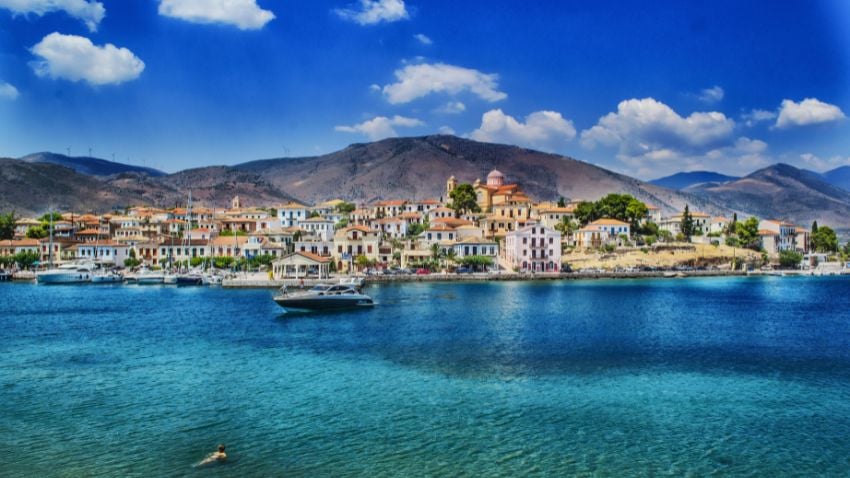
8 min read
Digital Nomad Visa Programs have revolutionized the way professionals work and travel, providing a gateway to a lifestyle where the world becomes both an office and a playground.
Digital nomad visas have been rising recently as remote work has normalized and global economies are beginning to open up again. If you are a freelancer or employee based in countries like Canada or the United States, the world is your oyster if you can work remotely.
This article will provide an overview of some of the best digital nomad visas to consider based on the income requirements, the application process, application criteria, and the length of the visa and renewal process. Many options in the Caribbean, Europe, and South America meet all of these requirements. Asia also has lots of potential, although it may take more time for countries to launch digital nomad visas.
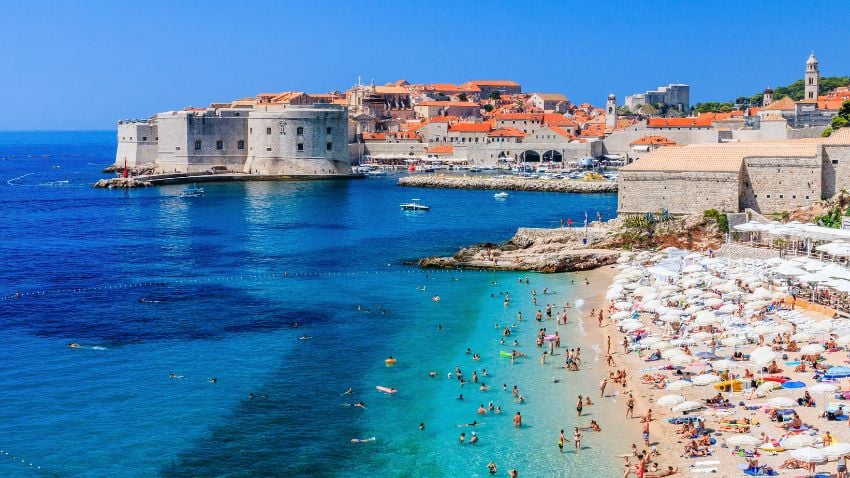
Dubrovnik, Croatia
Croatia’s digital nomad visa program is one of the most intriguing and accessible in Europe. With low-income requirements, a straightforward online application process, and no taxes for your first 12 months in the country, it’s an excellent choice for remote workers seeking a base in Europe.
Tourism in Croatia has seen an impressive recovery in recent years. After a significant drop to just 7 million arrivals in 2020 due to the coronavirus outbreak, the country welcomed 12.8 million visitors in 2021. By 2023, this number had surged to nearly 20 million, solidifying Croatia’s reputation as a premier travel destination.
The country’s economic outlook is equally promising. Croatia’s GDP is projected to grow by 3.6% in 2024, 3.3% in 2025, and 2.9% in 2026, driven by strong household consumption and investment. Employment rates continue to improve, with unemployment reaching historic lows. Meanwhile, inflation is expected to decline steadily, reaching 2% by 2026. Croatia’s fiscal health remains stable, with government debt projected to decrease further alongside robust GDP growth.
Whether you’re drawn by the economic opportunities or the ease of securing a digital nomad visa in Croatia, this vibrant country offers a unique blend of opportunity and lifestyle for remote workers and travellers alike.
If the application is submitted at a diplomatic mission/consular post (paid at the time of application):
€55.74 (approximately $58.91 USD) for granting the temporary stay.
€93.00 (approximately $98.22 USD) for the long-term visa (visa D). If you submit your visa application through the VFS visa center, an additional service fee will be charged.
€41.14 (approximately $43.45 USD) for the biometric residence card. Please check with the diplomatic mission/consular post about the possibility of obtaining the card.
If the application is submitted at a police administration/police station (paid after the stay is granted):
€46.45 (approximately $49.11 USD) for granting a temporary stay.
€9.29 (approximately $9.81 USD) for administrative fees for the issuance of the biometric residence permit.
€31.85 (approximately $33.64 USD) for the biometric residence card (€59.73 or approximately $63.09 USD for accelerated procedure).
Please note that exchange rates fluctuate, and the USD amounts provided are approximate values based on the current rate.
Visa Length: 1 Year
Income Requirements: €2,870 ($3,020 USD) per month or proof of sufficient savings
Extension: You can apply again but need to wait six months before doing so.
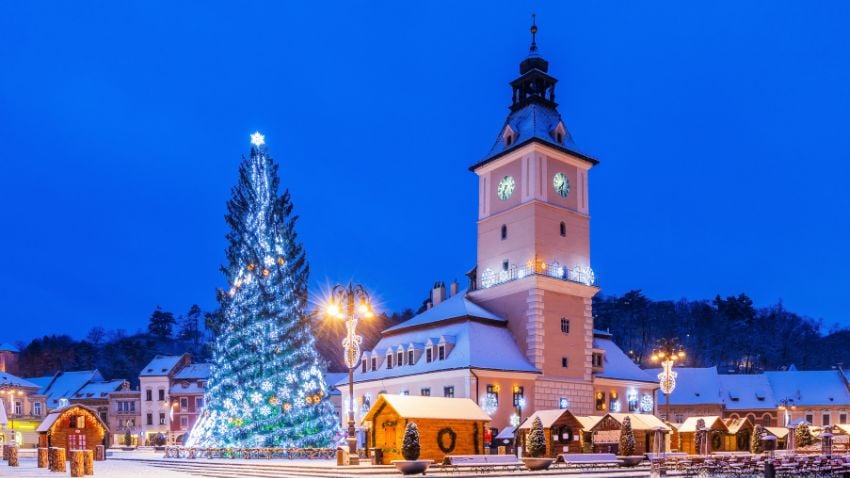
Brasov, Romania
Romania may not be the first European destination that comes to mind, but it offers an impressive blend of natural beauty, rich history, and modern accessibility for digital nomads. The Romanian coast spans over 200 kilometres (124 miles), with about half of it dedicated to seaside resorts, making it an attractive spot for relaxation and exploration.
The country is also a cultural treasure trove, boasting over 100 art museums, more than 55 historical and archaeological museums, and over 100 ethnography and anthropology museums. Romania’s vibrant history and diverse cultural offerings provide endless opportunities for discovery.
For digital nomads, Romania stands out with its low cost of living and straightforward application requirements, making it an ideal choice for those seeking an affordable and enriching European base.
Cost: Minimal costs (not yet confirmed by the government)
Visa Length: 1 Year
Income Requirements: $3,900 USD/month
Extension: You can reapply for another 12 months
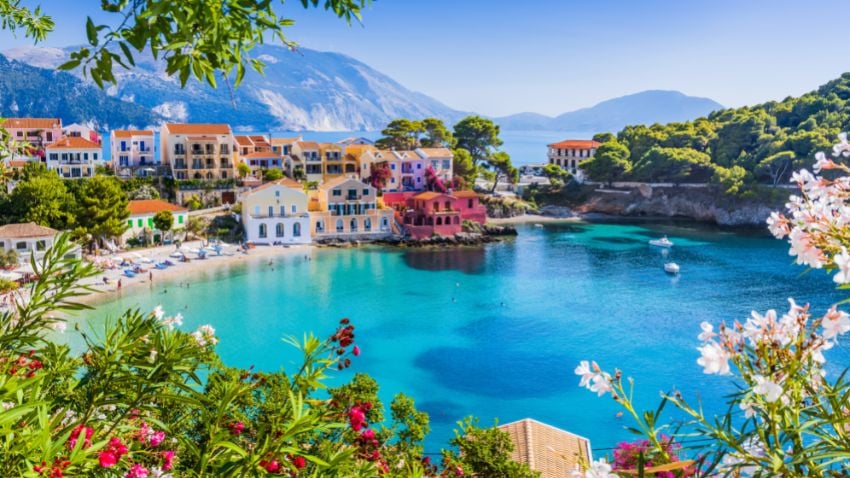
Kefalonia, Greece
Greece has long been one of Europe’s top tourist destinations, and it’s now becoming a hub for remote workers thanks to its digital nomad visa program. This initiative allows digital nomads to live and work in Greece for extended periods, with the option to extend the visa for up to two years. The application process is straightforward, requiring only a monthly minimum income of €3,500 ($3,673 USD). Additional benefits include Greece’s low cost of living and the ability to enjoy a long-term stay in a country rich in culture and history.
Tourism in Greece is thriving, with visitor numbers returning to pre-pandemic levels. The country’s iconic ancient sites, countless beaches, and stunning islands continue to make it one of the most popular global destinations. In 2023, travel and tourism contributed over 19% to Greece’s GDP, ranking it third in the EU after Portugal and Croatia. The sector also supported over 800,000 jobs in 2023, a figure projected to surpass one million by 2034.
Greece’s economic outlook is equally promising. GDP growth is forecast at 2.1% in 2024, with steady progress expected through 2025 and 2026, supported by the Recovery and Resilience Plan (RRP). Unemployment, now below 10%, continues to decline, albeit at a slower pace, while inflation is projected to moderate gradually from 3.0% in 2024 to 1.9% by 2026. The country is also seeing a steady reduction in public debt relative to GDP, which is expected to drop to around 140% by 2026.
Whether you’re drawn by its vibrant culture, rich history, or stunning landscapes, Greece offers a unique opportunity for remote workers. The Greece digital nomad visa program provides an accessible way to enjoy everything this Mediterranean gem has to offer. To start your journey, it’s easy to apply for a digital nomad visa in Greece and embrace the lifestyle of a digital nomad in Greece.
Cost: $80 USD
Visa Length: 1 Year
Income Requirements:
€3,500 (approximately $3,697.75 USD) for a solo digital nomad.
€4,200 (approximately $4,437.30 USD) if accompanied by a spouse.
€4,830 (approximately $5,102.89 USD) if accompanied by a spouse and one dependent.
Extension: You can extend this visa in one more year.
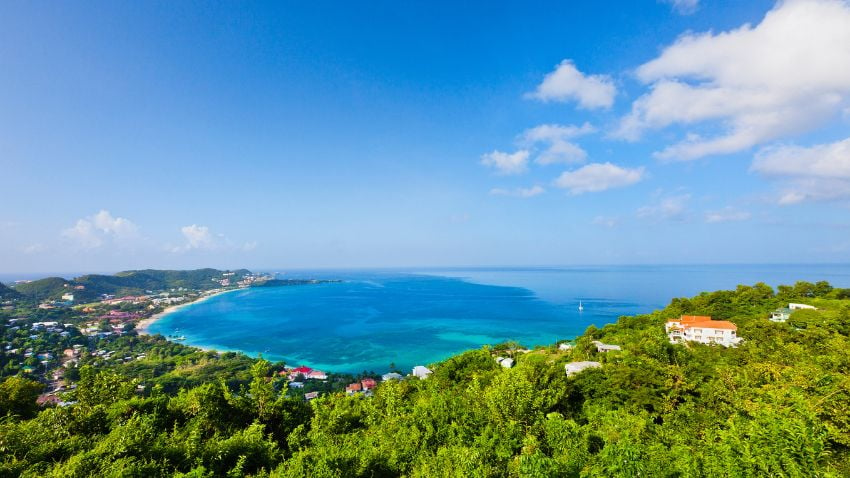
Grand Anse Bay, Grenada
Grenada is a popular Caribbean destination that recently began welcoming digital nomads in 2021. Unlike other Caribbean digital nomad visa programs, the minimum income requirements are low. Digital nomads only need to prove that they have an annual salary of $37,000 USD. While the application process is easy and has few requirements, it is important to plan in advance. There is no online application option for this program, so you must mail your application to the Grenada Embassy.
Cost: $1,500 USD/person and $2,000 USD for a family (four people)
Visa Length: 1 Year
Income Requirements: $37,000 USD/year
Extension: You can renew this visa for another year
Read more: Grenada Digital Nomad Visa
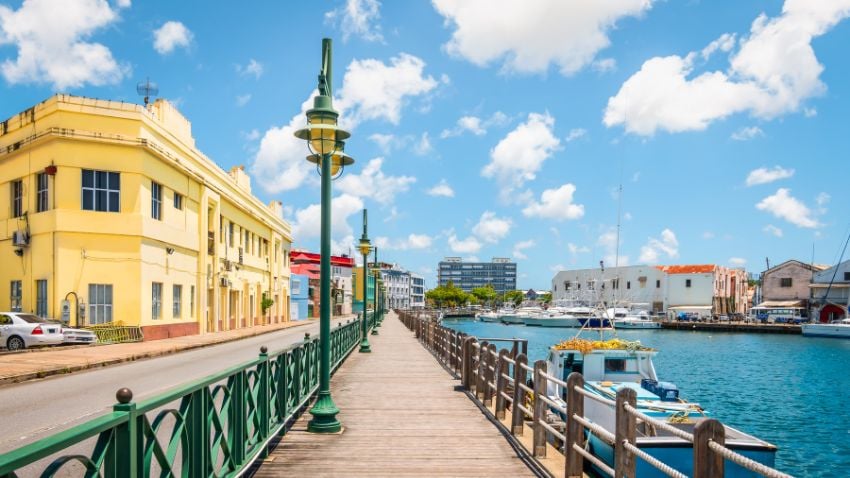
Promenade at the marina of Bridgetown, Barbados
The Barbados government introduced the 12-Month Barbados Welcome Stamp Program for digital nomads or remote workers who want to live in Barbados. To apply for this program, you must prove that you have an annual income of $50,000 and meet other program requirements. One benefit of this visa program is that you can bring family members. The visa application takes around seven days to process, and you can reapply for the program after the initial 12 months if you want to stay longer. The only downside to this DNV program, relative to others, is that the application fee is $2,000 USD or $3,000 USD for a family.
Barbados’ economy is on track to sustain its growth momentum through the end of the year, with real GDP projected to rise by approximately 3.8%. This growth is being fuelled by ongoing investments in both the public and private sectors, particularly in tourism and utility infrastructure. The digitization of operations across industries is expected to improve efficiency, lower costs, and enhance productivity. Additionally, workforce development initiatives focused on advancing technical skills are set to bolster economic resilience and adaptability.
The tourism sector is showing strong prospects for the winter season, with forward bookings for air travel in the fourth quarter up 9% compared to the same period in 2023. The England cricket tour of the West Indies is expected to drive a surge in visitor arrivals, while cruise activity is projected to surpass last year’s performance, supported by an 11.5% increase in scheduled cruise calls during the final quarter.
Cost: $2,000 USD/person and $3,000 USD for a family
Visa Length: 1 Year
Income Requirements: $50,000 USD/year
Extension: No extensions, but you can reapply and pay the application fee again.
Read more: Barbados Welcome Stamp Program.
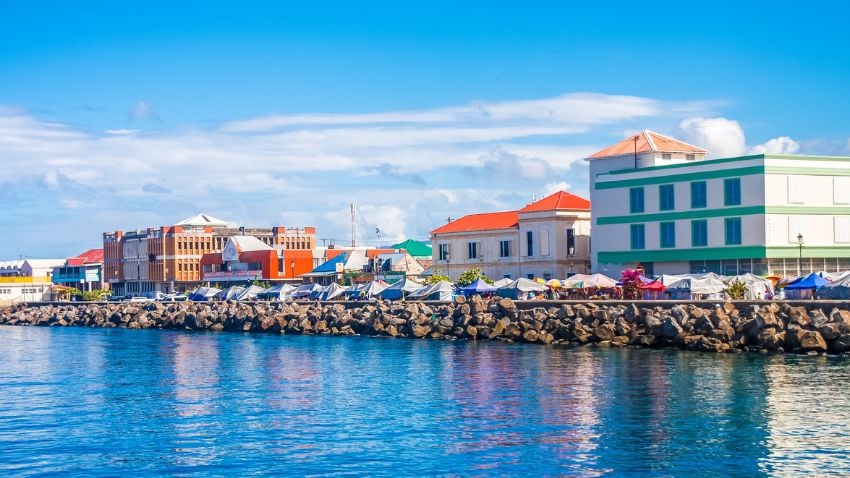
Colourful Waterfront on Dominica
The Dominica digital nomad visa is an excellent option for budget-conscious digital nomads seeking a program in the Caribbean. Dominica is one of the most affordable places to live in the region, with the average salary in the country being approximately $500 USD per month. The application process is simple and convenient—you can apply online and typically receive a response within seven working days. At around $800 USD, the application fee is slightly lower than that of some other Caribbean digital nomad visas.
For those looking to stay longer or explore citizenship options, Dominica’s Citizenship by Investment (CBI) program is worth considering. In 2023, the Commonwealth of Dominica welcomed over 339,000 international tourists, marking a 37% increase compared to the previous year. With its affordability, ease of access, and growing popularity, Dominica is becoming an attractive destination for digital nomads.
Cost: $800 USD/person and $1,200 USD for a family. There is a $100 USD refundable application fee, too.
Visa Length: 18 months
Income Requirements: $50,000/year
Extension: No extensions are available, but you can reapply.
Related content: How To Get A Passport In Dominica
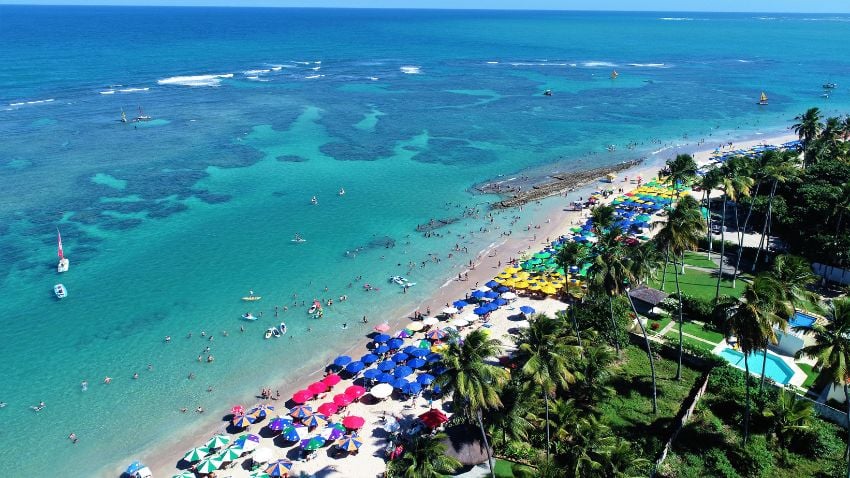
Porto de Galinhas, Pernambuco, Brazil
The Brazil Digital Nomad Visa is an outstanding option for those seeking to live and work in South America. Successful applicants will receive a one-year residency permit, with the opportunity to apply for a one-year extension. The income requirements for this digital nomad visa in Brazil are relatively low, making it an accessible choice for many. To qualify, you must demonstrate either $18,000 USD in savings or a monthly income of $1,500 USD.
To apply, you’ll need to submit your application at a Brazilian consulate. The process typically takes 3-4 weeks, after which you’ll receive a decision. The Brazil Digital Nomad Visa offers an excellent pathway for digital nomads looking to explore Brazil’s vibrant culture, diverse landscapes, and dynamic cities while enjoying the flexibility of remote work.
Cost: It is not clear the cost of the application process
Visa Length: 12 months
Income Requirements: $1,500 USD/month
Extension: Can be extended for another year
Read more: Brazil Digital Nomad Visa
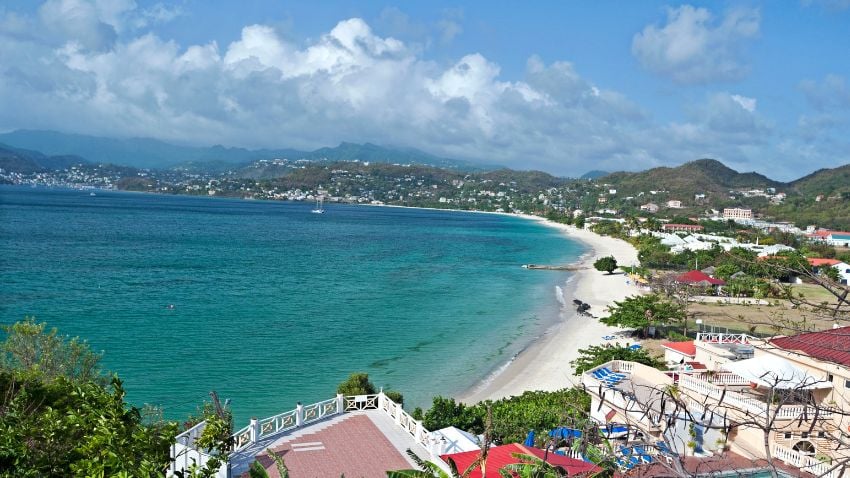
Jaco Beach, Costa Rica
Costa Rica has long been a popular destination for tourists and expats, particularly those looking to retire in its tropical paradise. Now, with the Costa Rica Digital Nomad Visa, remote workers have an excellent opportunity to stay in the country for a long time. This visa allows applicants to live in Costa Rica for up to 12 months. To qualify, applicants must meet specific requirements, including having health insurance and providing a monthly income of $3,000 USD. For those without a consistent income meeting this threshold, it may be worth exploring options in nearby countries like Brazil, Mexico, or Panama.
Costa Rica has been a development success story in many ways. As an OECD member since 2021, the country is celebrated for its democratic stability and innovative green initiatives, including being the first tropical nation to reverse deforestation. Its economic trajectory is equally impressive, with GDP growth averaging over 3% in the last decade and surpassing expectations with a 5.1% increase in 2023. This growth has been driven by a strategic, outward-oriented model that successfully attracts foreign investment and promotes gradual trade liberalization.
With its digital nomad visa, Costa Rica offers a unique blend of natural beauty, economic stability, and green innovation, making it an attractive choice for remote workers seeking a long-term base. If you’re considering becoming a digital nomad in Costa Rica, this program is a fantastic way to experience all the country has to offer.
Cost: $100 USD
Visa Length: 1 Year
Income Requirements: $3,000 USD/month
Extension: Can reapply for one more year
Related content: What To Expect While Living In Costa Rica
There are plenty of options outside the countries we covered that offer attractive digital nomad visas.
Europe: Estonia and Iceland are also interesting programs to consider if you have a relatively higher income. Furthermore, Germany and the Czech Republic offer digital nomad visas for freelancers, but the application is lengthier, and you have to demonstrate a specific interest in these countries.
Latin America: Mexico and Panama also offer digital nomad visas with reasonable income requirements. However, if you want to apply for the Panama program, you must send your application to an embassy or consulate.
Embark on a transformative journey of knowledge and inspiration by seizing the opportunity to purchase the ultimate Digital Nomad Visa book today.
If you want the best intel from the expat world, including profitable offshore opportunities, little-known tax-saving strategies, and hard-won insights on immigration, passports, and Plan-B residencies, all delivered to your inbox every single week, then join our daily correspondence, EMS Pulse®. Currently enjoyed by over 84,000 expats and expat-hopefuls worldwide. Fill in the form below to join our newsletter free:

Written by Mikkel Thorup
Mikkel Thorup is the world’s most sought-after expat consultant. He focuses on helping high-net-worth private clients to legally mitigate tax liabilities, obtain a second residency and citizenship, and assemble a portfolio of foreign investments including international real estate, timber plantations, agricultural land and other hard-money tangible assets. Mikkel is the Founder and CEO at Expat Money®, a private consulting firm started in 2017. He hosts the popular weekly podcast, the Expat Money Show, and wrote the definitive #1-Best Selling book Expat Secrets - How To Pay Zero Taxes, Live Overseas And Make Giant Piles Of Money, and his second book: Expats Guide On Moving To Mexico.

The word "Japan" brings to mind many things: high-tech, sushi, anime, samurai, and cherry blossoms. It is one of the most intriguing countries in...
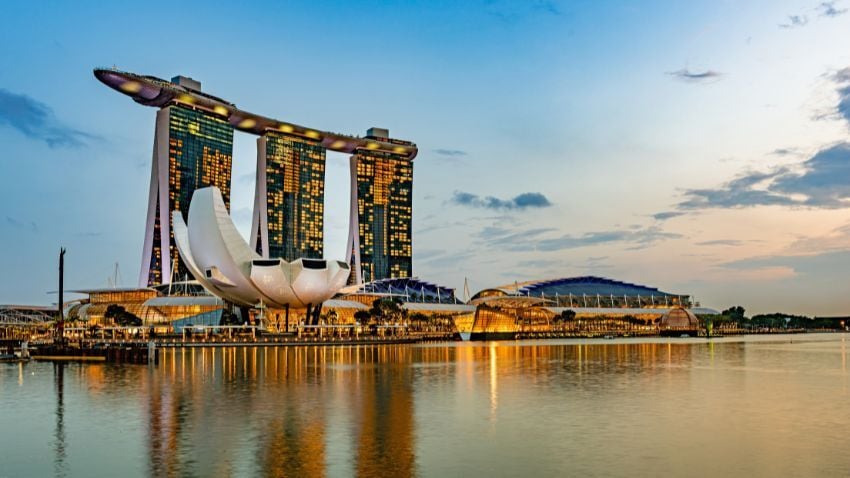
Singapore is often described as a city that works, and it totally deserves its reputation. This small island nation in Southeast Asia has built one...

Panama’s geographic size is modest, but its global relevance is not. The country connects two oceans and two continents, operates on a dollarized...